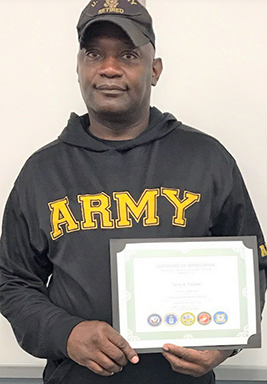Army Veteran Terry Tisdale is not the man he once used to be. For roughly 18 years, the Chattanooga native struggled with alcohol and substance abuse. His relationships with family members, including six grandchildren, were shattered, he was financially unstable, and his physical and mental health were at an all-time low.

Terry Tisdale’s children (l to r) Aaron Tisdale, Joshua Tisdale (eldest son who passed) and Alexis Tisdale
“I was lower than low. There were times I attempted suicide,” he said.
Tisdale served 15 years in the Army and worked hard to support his two sons and daughter.
“My kids saw me go through some bad times,” he said. “I was a single parent for nine years. I eventually got out of the Army in 2006, but my addiction probably started around 2000. It started out with alcohol, but it got worse.”
On June 11, 2017, Tisdale’s eldest son died at the age of 23.
Referred to VA because “I needed help.”
“I felt like I lost a part of myself,” Tisdale said. “I was still drinking but I started using crack-cocaine to kind of numb out the feelings and stop the nightmares. I thought it was helping me, but it only made things worse. I needed help and that’s when I was referred to compensated work therapy.”
In September 2017, Tisdale entered compensated work therapy at the Tennessee Valley Healthcare System. The therapeutic work program assists Veterans with mental health or physical disabilities. The program provides meaningful work and the opportunity to develop job skills while they continue to improve their overall health and wellness.
“Helped me through the hardest of times.”
“This program should really be called compassionate work therapy because, man, my vocational specialist, Bobie Smith, really helped me through the hardest of times,” he said. “I struggled with my recovery and keeping employment during the first year, but Bobie held me accountable. He really helped me with not giving up and encouraging me to keep applying for jobs and kept me on track with my recovery. He constantly checked in on me.”
Smith is as an Army Veteran and vocational rehabilitation specialist at the Chattanooga VA clinic. When Tisdale’s father passed in January 2020, Smith continued to ensure Tisdale stayed focused on his employment and recovery goals.
“I see my role as a facilitator of hope,” Smith said. “I work with Veterans to find employment, but I also help them keep it. Terry had a lot of struggles, but he came a long way and saw the importance of his recovery. This program wants to provide Veterans with better quality of life.”
“I want to give other Veterans that hope.”
In October 2020, Tisdale started working with an employer, but eventually left to take a new position as a housing aide at Tennessee Valley Healthcare System in April 2021.
He described how the compensated work therapy program redefined his goals mentally, physically, and spiritually, and how he no longer felt alone in his struggles.
“This program literally saved my life,” Tisdale added. “It was exactly what I needed in my life to provide purpose, direction and motivation. This program looks at you and tells you that you have value and purpose, no matter what you’ve been through. It gave me hope again and that’s what I want to do for other Veterans. I want to give back that hope.”
Learn more about the services Compensate Work Therapy offers.
Topics in this story
More Stories
The Medical Foster Home program offers Veterans an alternative to nursing homes.
Watch the Under Secretary for Health and a panel of experts discuss VA Health Connect tele-emergency care.
The 2024 National Veteran Suicide Prevention Annual Report provides the foundation for VA’s suicide prevention programs and initiatives.







